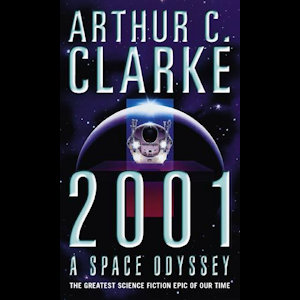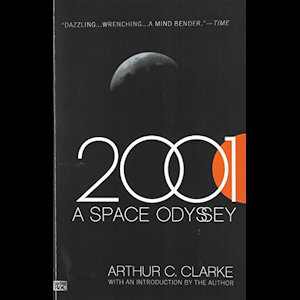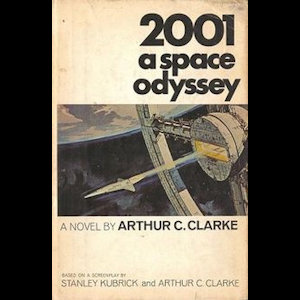The Summer of Arthur C. Clarke: 2001: A Space Odyssey
Before I begin, welcome to my Summer of Arthur C. Clarke. On the heels of last year's popular Slasher Summer, this year I'm leaving behind the guilty pleasure of the niche horror genre and exploring something a little closer to my own heart: namely science-fiction. Of all the sci-fi greats, none have influenced me more than the late Arthur C. Clarke, my personal favorite of the "Big Three" from the Golden Age of the genre (Asimov, Clarke, and Heinlein). This summer, I am going to look at a few of his most famous works, including the entirety of his 2001 series and the tiny handful of adaptations that have been made for film, television, and video games. Strap in and prepare yourselves for a journey into the stars and the mind, and let us never forget how much richer the world of fiction is for having been blessed by the incomparable Sir Arthur C. Clarke.
 | | You can open my pod bay doors whenever you like |
Given that it was written in collaboration with Stanley Kubrick as a template upon which the seminal film of the same name is based, it's difficult to examine 2001: A Space Odyssey on its own merits. I've read Clarke's novel dozens of times throughout my life, and I spent a grueling six months on it when I was in high school, learning how to apply the sort of hard academic analysis that would lay the foundation for my college career and beyond. However, even I have a hard time reading lines of dialogue from HAL 9000 in any voice but Douglas Rain's iconic droll, and even I still find myself wondering if the "Open the pod bay doors, HAL" scene is in the book or not. (It's not.)
This is why most discussions of the novel devolve into recitations of all the differences between book and film, weighing the pros and cons of each. While I could easily do that and have a perfectly enjoyable time of it, it seems more fitting in the context of this summer's exercize to examine 2001: A Space Odyssey not as it contrasts to the film but as it compares to Clarke's other works. Besides, I'll be writing at length about the film next week, and it will be easier to discuss its deviations from the source material there, just as I did with the Childhood's End miniseries.
Speaking of which, Childhood's End is a good place to start, as 2001 shares plenty of DNA with that novel (and several others in Clarke's library, including The City and the Stars). 2001 isn't based on Childhood's End, of course, as it is loosely adapted from a few of his previous short stories, especially "The Sentinel." Both stories, though--2001 and Childhood's End--use a fantastic cosmic backdrop of alien civilizations that span the breadth of the galaxy as springboards for a transcendant evolution of mankind, but 2001 is far more subtle in its execution. More importantly, 2001 has a much greater emphasis on actual science and technology, things conspicuously absent from Childhood's End. Clarke would gain a reputation as one of the greatest hard science-fiction authors of all time, and a lot of that reputation starts here, with 2001.
 | | I love this cover, but I'm not sure why |
Modern readers should keep in mind this novel was first published in 1968. Clarke was describing space travel during the earliest days of the space age, and he was describing the surface of the moon a full year before anyone had ever set foot on it. While it's easy to point out how fantastically wrong Clarke was about the state of the world in the actual year 2001, his discussions of the reality of space travel have barely aged at all. He clearly knew what he was writing about, and he respected the underlying science in a way that even veteran science-fiction writers rarely do.
Another important difference is his evolution as a writer. Childhood's End can be a clunky read at times, but 2001 has far fewer rough edges. It has long, poetic passages describing the surface of Jupiter or the approach of a red giant, and his descriptions never come across as clinical or unnecessarily detailed. His characters are also improvements, being more vivid and alive, albeit still adhering to the stoic scientist template that is Clarke's trademark. Both Heywood Floyd and Dave Bowman feel like genuine people with genuine emotion, and their characters have a few opportunities to drive the plot in ways Clarke's characters hadn't before.
That said, the most remarkable invention of 2001: A Space Odyssey is not the human characters, the reliance on scientific accuracy, or even the enigmatic aliens behind the monolith; it's HAL 9000. I'm not going out on a limb to argue that HAL is, hands down, Clarke's greatest character. The fact that it's an artificial intelligence is oddly fitting, I suppose. In a book so heavily focused on both technology and the nature of consciousness, HAL is the ultimate foil for humanity in general (and Dave Bowman more specifically), a set of learning algorithms that mimick intelligence so well that it's indistinguishable from the real thing. Clarke makes this emphatically clear, not just by citing the Turing test but also by showing the reader how HAL's mathematically-derived actions can be driven by subconscious considerations and even madness.
 | | Not even trying to get out of the film's shadow |
Given its importance to the underlying themes of the text and its impact on the later stages of the book's plot, it's remarkable how little time we actually spend with HAL. In the 297-page paperback, HAL isn't introduced until page 116 and "dies" less than ninety pages later. But boy, do those ninety pages leave an impact. While Asimov is usually the science-fiction heavyweight credited with inventing our popular notions of artificial intelligence, Clarke does more, through HAL, to make genuine artificial intelligence seem possible while simultaneously revealing more pitfalls than Asimov imagined.
When I first read 2001 as an adolescent, HAL felt like a meaningless digression. It's interesting, sure, but what does HAL have to do with the monoliths and with the ultimate technological evolution presented in the novel's final pages? As an adult, of course, I realize the answer is "absolutely everything." Clarke is obsessed with the notion of defining consciousness; it's a theme he goes back to again and again throughout his writing career. In the opening chapters of 2001, it is the monoliths that expand the base-level, instinctual consciousness of ape-men to the fully sentient beings we call humanity, and in the closing chapters, it is through extremely advanced technology that biological entities (such as Dave Bowman) are able to shed their physical forms and become pure, unadulterated consciousnesses spread throughout the overwhelming chasms of space and time. HAL's creation is a reflection of both the beginning and end of the story, in that the A.I. is humanity's attempt to create consciousness the way the monolith does while also being the potential endpoint of technological advancement either through the dangers of overreach or the realization of what consciousness actually is.
Overshadowed by the film--which was released prior to the novel even though, technically speaking, the initial draft of the novel was written first--Arthur C. Clarke's 2001: A Space Odyssey isn't given enough credit for how much it evolved Clarke as a writer. It marks a maturing point for many of his ideas, a strengthening of his writing style and ability to characterize, the beginnings of his love affair with hard science, and his first real collaboration with another artist. It also gave the world HAL 9000, a creation so singularly important to Clarke's ideas that it would resonate far beyond even his own work. Despite that, however, the most lasting achievement of the novel--no matter how great and important it is in isolation--is that it laid the foundation for the single most important science-fiction film ever made. But that's a topic for next week.
-e. magill 5/31/2018
THE UNAPOLOGETIC GEEK'S
SUMMER OF ARTHUR C. CLARKE: | |
|
|
|